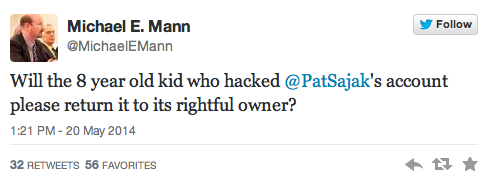In America, your opinions do not count unless you are a celebrity. And when celebrities such as Wheel of Fortune’s Pat Sajak tweet about scientific issues, media outlets give these uninformed utterances an inordinate amount of attention.
Did you hear on CNN about the paper in this week’s Nature on how global warming is changing Arctic precipitation? Probably not. Did you catch the Fox News summary of the paper in Science two issues ago about rising carbon dioxide and soil decomposition? I didn’t think so. Those are examples of actual current research on climate change, and this new knowledge was mostly greeted by silence. But you heard about Pat Sajak’s tweet, which was this:

Wow—all that in only 115 characters. Just think of the stentorian eloquence Pat Sajak could have manifested if he had exploited all 140 characters at his command!
“Alarmists” we’ve heard before. That’s the kind of word a crotchety old man who doesn’t want to get out of bed uses to describe the fireman who is pounding on his front door, warning him his house is on fire. But “racists”? Where did that come from? Does Sajak know something we don’t about Don Sterling’s views on climate change?
Probably the best response to this came from climate scientist Michael Mann, who said:

Sajak’s comment was indeed juvenile. Much of the silliness that eight-year-olds say can be forgiven, considering they simply haven’t had the time to become well-informed about climate change, the most serious issue now facing humanity. For adults, though, there is no excuse. And for someone in the public eye, whose banal tweets become headlines on national news, the only proper adjective is this: irresponsible.
With great celebrity comes great responsibility, which is why SAG members swear a version of the Hippocratic Oath, pledging to use their fame for good rather than evil, and to tweet nothing that would harm the public weal. Just kidding! Many feel no sense of responsibility to check if the half-baked, ill-informed things they say and tweet have any basis in reality. (Yes, I’m looking in your direction, Jenny McCarthy.)
As part of the media onslaught about Sajak’s tweet, CNN inexplicably invited conservative columnist Ann Coulter to pontificate about Sajakgate, or tweetgate, or whatever the hell-gate it should be. And in elevating Coulter to such a prominent platform on such a topic, CNN moved beyond mere irresponsibility to something much darker: willful malice toward the American public.
Coulter is perhaps the most predictable of all television talking heads. Her indignation at the indignation toward Sajak unsurprisingly segued into her usual hackneyed talking points: climate change, environmentalism, Hollywood bashing.
Perhaps missing the irony in the quote she offered—“Thinking is a hate crime”—Coulter outlined what she feels is the real problem with people these days:
We all have to believe in global warming, we all have to believe in immigration…we all have to believe that Trayvon Martin was killed by a brutal racist, and if you don’t then you get called all these crazy names.
Hmm. Well, because we can objectively observe immigration happening, “believing” in it would seem reasonable. Likewise for the proposition that Trayvon Martin was, in fact, killed. So what’s the problem with global warming? Those hurtful “crazy names,” apparently:
The worst and most offensive [crazy name] is the ‘global warming deniers.’ That comes from people who are Holocaust deniers. You are calling half of the American people, who weirdly enough don’t believe the apocalyptic predictions that keep not coming true, equivalent to Holocaust deniers, that’s how debate proceeds in America.
Let’s unpack the “apocalyptic predictions” part first. If Coulter had spent the time to read even just one of the IPCC reports or similar materials produced by actual climate scientists, she would have learned that most climate models focus on conditions near the end of the century—in other words, the year 2100. We have not seen “apocalyptic predictions” come true yet because it’s only 2014.
Consider the media reaction last week to the alarming report about the collapse of the Western Antarctic Ice Sheet. The “unstoppable” language got people’s attention, as did the “10 feet” of sea level rise. But the time frame was often lost in discussions; many talking heads on television spoke as if this was going to occur within a few years, when in fact the time range is two centuries.
Coulter’s inchoate rage at the use of the word “denier” shows just how appropriate the term is for describing someone who, despite overwhelming evidence, is unable to come to terms with a difficult truth. They grasp at the similarity to the term “Holocaust denier,” accusing their opponents of hyperbole by allegedly equated them with the Ahmadinejads of the world.
“Denial” has many uses unrelated to the Shoah. As friends of Bill W. are fond of saying, denial isn’t just a river in Egypt. But the best comparison is to moon landing deniers; just try to talk to one of them about how rather improbable it is that NASA hired Stanley Kubrick to direct a fake lunar landing, and you’ll drift in a fact-free river of endless denialism.
Sajak’s tweet, and Coulter’s anger, are really just symptoms of broader problems. One problem is the unearned power and false wisdom we ascribe to the opinions of celebrities, to the exclusion of the expertise of those with real knowledge. Another problem is the nature of the medium; not much worthwhile can be written in 140 characters, or shouted in a few interrupted moments between endless commercials. As McLuhan so famously noted, the way mass communications happen influences and affects what is communicated.
So if America ever begins to awaken from our growing un-enlightenment, you will know it by this sign: Pat Sajak will tweet some uniformed opinion about science, and no one will care.
